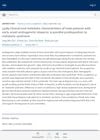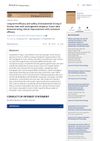 1 citations,
January 2009 in “Journal of Clinical Dermatology”
1 citations,
January 2009 in “Journal of Clinical Dermatology” Hair loss after childbirth is more common in women who have had multiple births, cesarean deliveries, significant weight gain, and full-term pregnancies.
 1 citations,
January 2002 in “Journal of Clinical Dermatology”
1 citations,
January 2002 in “Journal of Clinical Dermatology” The document's conclusion cannot be provided because the document is not accessible or understandable.
 1 citations,
January 2002 in “Journal of Clinical Dermatology”
1 citations,
January 2002 in “Journal of Clinical Dermatology” Low iron levels in the blood may be linked to chronic hair loss in women.
 October 2024 in “International Journal of Molecular Sciences”
October 2024 in “International Journal of Molecular Sciences” Rosa rugosa extract promotes hair growth and could be a natural treatment for hair loss.
 October 2024 in “Current Issues in Molecular Biology”
October 2024 in “Current Issues in Molecular Biology” Platycladus orientalis leaf extract helps hair grow by activating certain proteins.
 September 2024 in “Clinical and Experimental Dermatology”
September 2024 in “Clinical and Experimental Dermatology” COVID-19 increased hair loss cases, but vaccination did not.
 September 2024 in “Journal of the American Academy of Dermatology”
September 2024 in “Journal of the American Academy of Dermatology” Baricitinib 4 mg is effective and safe for treating severe alopecia areata.
 September 2024 in “Journal of the American Academy of Dermatology”
September 2024 in “Journal of the American Academy of Dermatology” Early-onset male baldness may increase the risk of metabolic syndrome.
Certain genes may influence hair loss differently in men and women.
 July 2024 in “Experimental Dermatology”
July 2024 in “Experimental Dermatology” AP collagen peptides help hair grow and improve hair health.
 June 2024 in “Korean Journal of Pharmacognosy”
June 2024 in “Korean Journal of Pharmacognosy” The compound from Rhododendron mucronulatum roots may help treat male pattern hair loss.
 June 2024 in “International journal of molecular sciences”
June 2024 in “International journal of molecular sciences” Adenosine complex helps increase hair thickness and density in hair loss.
 June 2024 in “Archives of Dermatological Research”
June 2024 in “Archives of Dermatological Research” SFRP2 and PTGDS may be key factors in female hair loss.
May 2024 in “Molecules/Molecules online/Molecules annual” Plant extracts can help prevent hair loss and promote hair growth.
 April 2024 in “BMB Reports”
April 2024 in “BMB Reports” Lack of Cisd2 disrupts calcium balance in cells, leading to poorly functioning neutrophils.
 April 2024 in “Lasers in medical science”
April 2024 in “Lasers in medical science” Near-infrared LED light improves skin rejuvenation and hair growth better than white LED light.
 April 2024 in “Human genomics”
April 2024 in “Human genomics” Identified genes linked to male-pattern baldness may help develop new treatments.
 March 2024 in “Medical lasers”
March 2024 in “Medical lasers” Multiple-wavelength radiation helps hair grow by boosting early hair follicle development.
 March 2024 in “Animal nutrition”
March 2024 in “Animal nutrition” Adding both soluble and insoluble fibers, especially beet pulp, to the diet of pregnant sows helps improve their health and the growth of their piglets in hot weather.
 March 2024 in “The journal of sexual medicine”
March 2024 in “The journal of sexual medicine” Finasteride's negative effects on brain tissue in male rats may be reversible after stopping the drug.
 February 2024 in “Scientific Reports”
February 2024 in “Scientific Reports” Topical minoxidil and dietary supplements improved hair regrowth in children with hair loss from chemotherapy.
 February 2024 in “Research Square (Research Square)”
February 2024 in “Research Square (Research Square)” The research suggests that SFRP2 and PTGDS proteins might be indicators of female pattern hair loss and could contribute to hair loss.
 February 2024 in “Biomedical materials”
February 2024 in “Biomedical materials” Scientists created a lab-grown hair follicle model that behaves like real hair and could improve hair loss treatment research.
 February 2024 in “The Journal of Dermatology”
February 2024 in “The Journal of Dermatology” Dutasteride 0.5 mg is safe and effective for long-term use in Korean men with hair loss.
 January 2024 in “Diabetes & metabolism journal”
January 2024 in “Diabetes & metabolism journal” Disrupting natural body clocks increases the risk of developing type 2 diabetes.
 January 2024 in “Research Square (Research Square)”
January 2024 in “Research Square (Research Square)” The research identified genes linked to male-pattern baldness and potential drug targets for treatment.
 January 2024 in “Journal of applied biological chemistry”
January 2024 in “Journal of applied biological chemistry” Glehnia littoralis and Andrographis paniculata extracts can significantly boost hair growth.
 January 2024 in “Journal of Medicinal Food”
January 2024 in “Journal of Medicinal Food” Rambutan extract can help reverse hair loss caused by testosterone.
 January 2024 in “Journal of neurogastroenterology and motility”
January 2024 in “Journal of neurogastroenterology and motility” Quadruple-coated probiotics significantly improve IBS symptoms.
 January 2024 in “Annals of Dermatology”
January 2024 in “Annals of Dermatology” Female pattern hair loss greatly affects women's quality of life, causing mild depression and anxiety, and increases medical expenses.




























